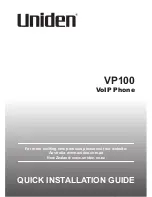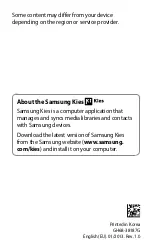
In the above example, if a hearing aid meets the M2 level rating and the
wireless phone meets the M3 level rating, the sum of the two values
equal M5. This is synonymous for T ratings. This should provide the
hearing aid user with "normal usage" while using their hearing aid with
the particular wireless phone. "Normal usage" in this context is defined as
a signal quality that is acceptable for normal operation.
The M mark is intended to be synonymous with the U mark. The T mark is
intended to be synonymous with the UT mark. The M and T marks are
recommended by the Alliance for Telecommunications Industries
Solutions (ATIS). The U and UT marks are referenced in Section 20.19 of
the FCC Rules. The HAC rating and measurement procedure are described
in the American National Standards Institute (ANSI) C63.19 standard.
This handset has been tested and rated for use with hearing aids for some
of the wireless technologies that it uses. However, this handset also
incorporates a Wi-Fi air interface technology that has not been rated for
hearing aid compatibility with respect to Wi-Fi operation. There may also
be some newer wireless technologies used in this phone that have not
been tested yet for use with hearing aids. It is important to try the
different features of this phone thoroughly and in different locations,
using your hearing aid or cochlear implant, to determine if you hear any
interfering noise. Consult your service provider about its return and
exchange policies and for information on hearing aid compatibility.
Содержание Strive SGH-A687 Series
Страница 1: ...User manual SGH A687 ...














































